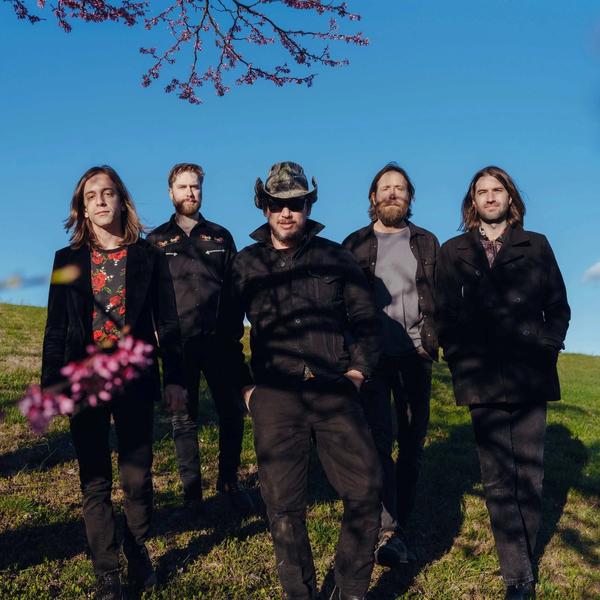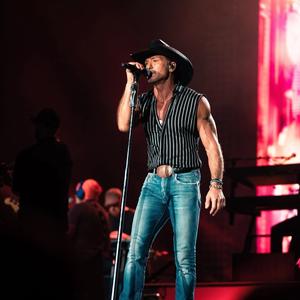




Link copied

In the middle of a cross-country move from Asheville to Austin days before the release of Susto's newest album, My Entire Life, Holler hopped on the line with recording artist and touring juggernaut, Justin Osborne.
His perspective on life has altered in a myriad of ways just recently, due primarily to becoming a father, losing his father, going through a break-up and a series of struggles with siblings suffering from drug addiction and mental illness, all in a short span. But paradigm shifts are nothing new to this resilient, maybe even optimistic, songwriter.
"There have been moments that have been really, really challenging, where I didn't know if I could keep going, all pushing me to places that were the lowest I can ever remember being. But those shifts happened because they needed to, and you know what? I'm fine today," he bolsters, aiming to embrace events that ultimately expand his mind.
Those themes have certainly worked their way into this new collection. "The life of a touring musician is never completely calm, but I've reached a good balance recently," he says, "and that's a lot of what this new record is about - this patchwork of challenges threaded together by moments of joy, knowing there's going to be light on the other end and pursuing that until it becomes a reality."
With a cover produced by the band's drummer, Marshall Hudson, utilizing an original painting by Glasgow's Gordy Livingstone, this fifth Susto record portrays a man that the band saw as an abstract version, or a likeness, of Osborne, noting the knuckle tattoos, which Justin also dons.
There's also a psychedelic slant to the illustration, in addition to Christian religious imagery, which is key to Osborne's upbringing, well before he found spiritualism and Humanism. The original painting by Livingstone is called Fat Lip (probably not a Sum 41 reference, estimates Osborne, before admitting he wouldn't be upset if it were).
While Osborne's affinity for pop-punk is no secret (check out his former band Sequoyah Prep School), his musical taste lately leans into what he finds relatable as a touring artist: transience, balance/imbalance and the essence of myths and psychedelic journeys.
Fueled by a certain South Carolinian pride, a stint at military school, teenage break-ups, drug dealers and astrology, we invite you to learn about this forward-thinking creative by taking a deep dive into his musical past. Here are Justin Osborne's Songs That Changed My Life.
Townes Van Zandt - To Live is to Fly
I discovered Townes when I was in my old band, which was this post-pop-punk folk band. A folk-emo band, I guess. I was departing from that world and discovering these iconic songwriters that had never been on my radar. I got into Townes quickly. I started watching any sort of videos or documentaries I could find, reading about him and listening to all his records. Many of his songs resonate with me deeply, but ‘To Live is to Fly’ feels like comfort food because it reminds me of my life—always being in motion and heading to the next place.
I love the lines, “I'll miss the system here / The bottom's low / And the treble's clear / But it don't pay to think too much / On things you leave behind”. It makes me think about my favorite venues, spending time in a place, whether it's for a long time or briefly, but also not being weighed down staying. I relate to that transient ethos; you gotta keep moving. My career choices have nurtured that spirit in me, but having that sort of outlook and appreciation for travel and meeting people has also enabled me to do it. Depending on the kindness of strangers in different places is a big part of my identity, and that song speaks to me.
Wilco - Red-Eyed and Blue
I get compared to Wilco a lot. I think the influences are pretty obvious, and that's fine, everyone is a product of their influences. I remember the first time I ever discovered Wilco. I was in Bossier City, Louisiana, which is basically Shreveport. My old band played at this casino, and one of the bartenders was going to sell us some weed. We went to his house after the show and we're smoking with him, and he just starts playing this song on guitar. It's ‘Red-eyed and Blue’ from Being There. I was like, "Dude, did you write that song? That sounds so good," and he said, "No, bro, that's Wilco." I was like, "Never listened to 'em." He was like, "What?" and did the classic drug dealer thing, saying, "You've got to watch this."
We hung out at his house for hours, watching this entire Wilco documentary, Ashes of American Flags. It's like a tour doc with a lot of live footage and versions of the songs with interviews. That song led me down the path of a band that, at least for a time, and in an informative way, became one of my favorite bands. I wouldn't say I'm such an active follower of Wilco now. I love them, and any time I get to see them live, I try to. But some of their records I fell in love with then, like Summerteeth and Being There, are still very important to me now. They also showed me what alt country could be. I was probably 22 or 23, booking shows on Myspace, but that was life-changing for me. It opened up a lot and changed my perspective.
Sturgill Simpson - Turtles All the Way Down
This tune might be an obvious one for fans of alt country and psych country, but I have to say ‘Turtles All the Way Down’ by Sturgill Simpson. When Metamodern Sounds in Country Music came out, I had just released my first Susto record. They came out around the same time. I started exploring psychedelics in my personal life for a number of different reasons, but hearing someone sing these crisp, amazingly written and produced country songs that were talking about psychedelics and religion was seriously inspiring to me. I can't say that enough.
It really influenced the direction of the next Susto record and still influences me today. Not being afraid to be vocal about the things I was exploring and the way my perspective was shifting through that - that record, and that song, I remember them as being monumental. I was already feeling drawn that way, and then I was like, "Okay, this is a movement, and maybe I can be a part of it."
Cat Power - Lived in Bars
A lot of my favorite songs are those that speak to me and my lifestyle as a touring musician. Life-changing is hard to quantify, but sometimes a song can change your life just by existing as something you can find comfort in. One of those songs for me is ‘Lived in Bars’ by Cat Power, from her album The Greatest. I didn't discover that record until it was probably 10 years old, but it's such a favorite of mine. I can listen to it all the way through, and the song ‘Lived in Bars’ has this libertine-ness to it that, I think, a lot of touring folks have. It just comes with the territory of being transient and being in bars literally every night, chasing the party. Not that that's sustainable. You find ways to balance it and try to self-care.
I've always felt like Cat Power speaks to my feminine counterpart inside of me. I've always seen her in this spiritual way. We have the same birthday, too. So, she's one of my favorites. That song... I feel like she's writing that from a perspective that would be me if I were a woman. I don't know if that's cool to say or not. It's a little woo-woo and far out, but, you know.
Grateful Dead - Franklin's Tower
This band was transformational for me. I decided to get into them when I first went to college right out of high school. I went to a military college in South Carolina, a place called The Citadel. I'd gone to Christian school my whole life, and suddenly I'm at this military college, which was conservative but not religious. There was a lot of college culture, even though it was military. Some of my upperclassmen and mentors were into jam music, and I'd never been introduced to Grateful Dead. I'd always seen the imagery and was fascinated by it, but had never taken the dive into their music. I got into them through Limewire. I just downloaded everything I could find that was Grateful Dead, and some of it wasn't even really them, I found out later. It was the lyrics that struck me, though.
One song in particular is ‘Franklin's Tower’. Using this mythical language that takes people on this quest, you're telling this epic story through song—that was powerful to me. It inspired me in my writing, an approach to songwriting using Evangelical Christian terminology, but inspired by Grateful Dead—this Biblical-Grateful Dead myth storytelling. I like to play with it sometimes. Arthurian maybe? I don't know how to name it. That song was a jumping-off point for me to get more acquainted with the rest of their music, go deeper than just the lyrics and understand what they were doing as a band and as a culture.
Bob Marley & the Wailers - No Woman, No Cry
This one's off the path a bit, but I've always been a Bob Marley fan. It's hard to choose one song in particular, but with ‘No Woman, No Cry’, the live version from Legend, I remember hearing this prophet-esque voice singing about shared suffering and loss, but saying, essentially, that it's going to be okay, and hearing the crowd singing behind him.
Hearing that live recording on Legend, which is like everyone's intro to Bob Marley, was powerful for me. It was probably some of the first live-recorded music I heard, especially on that scale. It felt spiritual in a human way and illustrated the power of music - live music - and shared experiences.
Hootie & the Blowfish - Let Her Cry
I'm from South Carolina. I don't live there anymore, but I was born and raised. It's part of my identity, and you don't come out of South Carolina and not love Hootie and the Blowfish. Their album Cracked Rear View has always been a favorite of mine. We actually got to open for them in an arena in North Carolina a couple of months ago. It was so incredible. They've been mentors of mine for the last few years now, but they're in this different world. They were a big deal when they broke, and it's been part of my identity as a South Carolinian, getting down on some Hootie.
I just relate to the song ‘Let Her Cry’. There have been many times in my life, going through break-ups, or whatever, where that song has been there for me. I can remember very early on in my life, probably twelve or thirteen, getting broken up with and feeling heartbroken and turning to Hootie and feeling like I had a friend in that. I might get made fun of, but you know what—I'm a proud South Carolinian, so I'm not going to worry about it.
---
My Entire Life is out now via New West Records. For more on Susto, see below:




